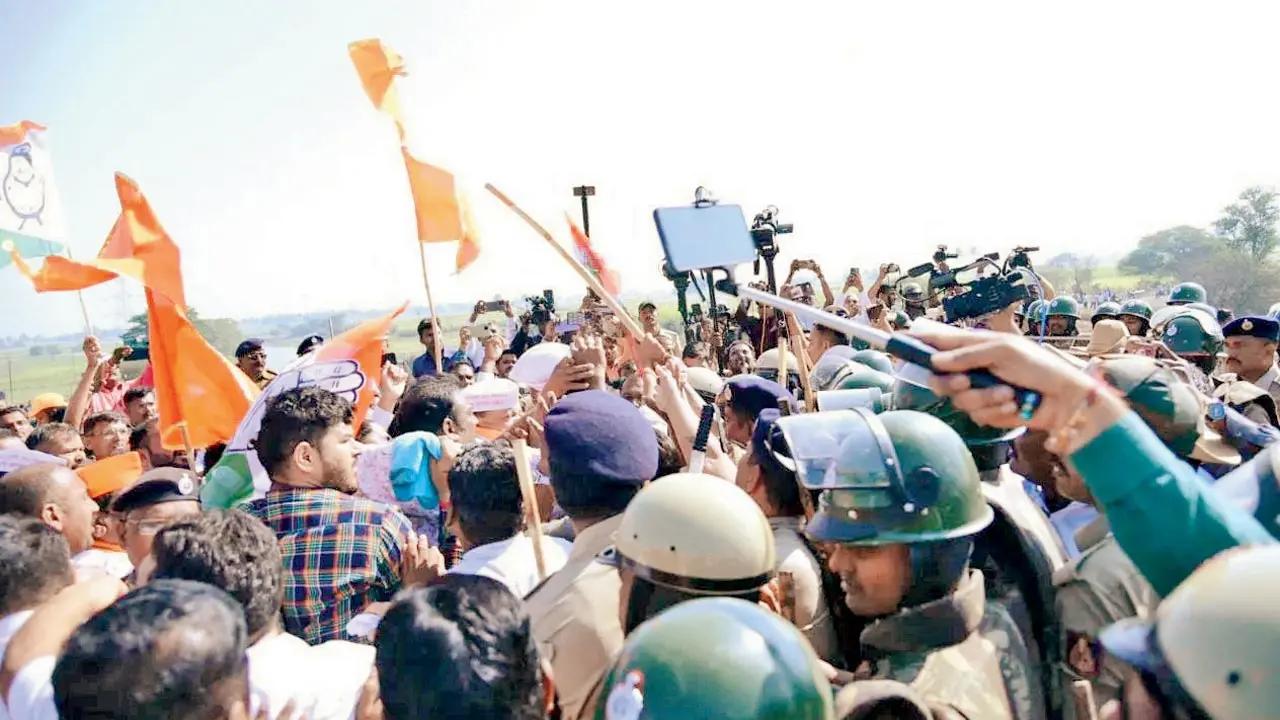The dispute has its roots in the States Reorganisation Act, 1956 – that made extensive changes in organising the boundaries of Independent India’s states and territories on linguistic lines. Following India’s independence, Belagavi district of the then Bombay Presidency became a part of Bombay state.

Representative Image.
Controversial remarks by politicians of Maharashtra and Karnataka over the long-standing dispute of Belagavi (Belgaum), a border district in Karnataka, have flared-up tensions between the two states. The remarks also led to violence and vandalism, prompting the Union Home Minister Amit Shah to step in.
ADVERTISEMENT
Shah held talks with both Karnataka chief minister Basavaraj Bommai and Maharashtra chief minister Eknath Shinde and said that ‘boundary disputes cannot be settled on the streets but only through constitutional means’.
In this piece, mid-day explains the issue – from its root to the recent flare-up.
The dispute
The dispute has its roots in the States Reorganisation Act, 1956 – that made extensive changes in organising the boundaries of Independent India’s states and territories on linguistic lines. Following India’s independence, Belagavi district of the then Bombay Presidency became a part of Bombay state. In 1956, with the implementation of the States Reorganisation Act, Belagavi, with its majority Marathi speaking population, was incorporated into the then Mysore state – the present-day Karnataka. Maharashtra also got hold of the adjoining areas with majority Marathi speaking population.
Opposing the implementation of the States Reorganisation Act, Maharashtra government requested readjustment of the border as it submitted a memorandum to the Ministry of Home Affairs in 1957, invoking Section 21 (2) (b) of the said Act.
Maharashtra claimed 865 villages, including Belagavi, Naipani and Karwar. Karnataka (then Mysore), on the other hand, wanted the existing status to be maintained. On October 25, 1966, by constituting the Mahajan Commission – led by the then Supreme Court Chief Justice Meher Chand Mahajan – Indian Union government attempted to resolve the dispute, but that resulted in no attainable outcome.
The Mahajan commission in its report maintained that Belgaum (Belagavi) should remain a part of Karnataka. The panel further recommended 247 villages, including Akkalakote, Jatta and Sholapur to be a part of Karnataka and 264 villages including Nippani, Khanapur and Nandagad to be a part of Maharashtra.
Maharashtra rather ran counter to the commission’s report, and termed it biased. Karnataka wanted any of the two ways to be followed: either put the commission’s report into action, or maintain the status quo. Though the Mahajan commission’s report was tabled in the parliament in 1970, it was never discussed.
In March 2004, the Maharashtra government approached the Supreme Court of India, filing a plea challenging the implementation of the State Reorganisation Act, 1956. In 2005 the then Congress-led UPA government attempted to look into the matter by holding talks between the chief ministers of the two states and Prime Minister Manmohan Singh but couldn’t reach a possible agreement.
The politics around the dispute continued, political parties’ manifestos widely stressed on the issue in both states. Apart from core political parties, pressure groups like – Maharashtra Ekikaran Samiti and Karnataka Rakshana Vedike actively advocated for their part of the matter in question. Karnataka also built a second legislature in the Belagavi district, holding a five-day assembly session in Belagavi in 2006. Till today, the dispute is still hanging in the air, fuelling social-political controversy.
The flare-up
In November, Maharashtra Chief Minister Eknath Shinde called for a meeting in Mumbai addressing the Maharashtra-Karnataka border dispute. In the same meeting, he announced to provide pension and Mahatma Jyotiba Phule Jan Arogya scheme benefits to whom he termed as ‘freedom fighters’ in Marathi-speaking Belagavi. He also appointed a ministerial committee to look into the matter in question.
This received flak from Karnataka with its CM Basavaraj announcing grants for Kannada schools in Maharashtra and that Karnataka was claiming 40 villages in Maharashtra. And this led to further escalation of the issue – as political leaders from both the states started to speak up publicly on the matter.
In response, Maharashtra CM Eknath Shinde and Deputy CM Devendra Fadnavis said that the state government will not let an inch of land go to Karnataka.
Maharashtra ministers Shambhuraj Desai and Chandrakant Patil’s plan to visit villages claimed by their state, meet leaders of the Maharashtra Ekikaran Samiti, and visit families of those killed in police firing in June 1986 while protesting Kannada being made a compulsory language in schools there, added to the tensions.
On the same day, violence and protests erupted in and around Belgaum with police arresting hundreds. Vehicles at the Karnataka-Maharashtra border areas were attacked by political cadres on both sides. This led to the ban on the entry of Maharashtra ministers – Patil and Desai – and MP Dhairyasheel Mane to the district.
On December 13, Shiv Sena (Shinde faction) leader and Member of Parliament Rahul Shewale met president Droupadi Murmu to seek her interference in the dispute.
On December 14, Home Minister Amit Shah chaired a meeting with Maharashtra Chief Minister Eknath Shinde and Karnataka Chief Minister Basavaraj Bommai. Maharashtra Deputy CM Fadnavis and Karnataka Home Minister Araga Jnanendra were also a part of the meeting.
Addressing the issue, Shah said that both the states agreed to form a committee headed by a senior IPS officer to maintain law and order in both the states. Shah said that six ministers, three from each state, will hold talks on the issues related to the matter. “All should wait for the outcome of the discussions of the committee formed to resolve this issue.
 Subscribe today by clicking the link and stay updated with the latest news!" Click here!
Subscribe today by clicking the link and stay updated with the latest news!" Click here!







